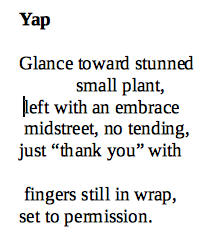I was trying a new approach to editing/shaping some of my recent poems, one based on visualising size (comprehension?) as impossible, a sort of folding up of affect/emotion into something of the same extent. OK, so the link to ‘egotistical sublime’ is prima facie fairly weak, but I need to find a means to move beyond the improvisation/generative technique I have learnt, to order its non-music. At this point, I am looking for poems that do – while expressing content, just as the improvisations expressed an idea – the above, perhaps via deconstruction. Quite how to do that, I’m unsure, if only because “deconstruction is not a method” (I assume this means it is a goal).

Does ‘waking from sleep paralysis’ deconstruct or just reverse a ‘false awakening’? I don’t suppose it matters at all, but if you want to take it literally – not just radically oppose two phrases – you have reversed nothing: a dramatic escape from sleeping does not mean we never failed to wake up – anymore than we will not dream again – but displaces dreaming with the world, allows us to think again their difference. If it seems otherwise, maybe that’s due to urgency to negation, not thinking through contradictions but forgetting one side, the dream, which we could begin to work with.
I suppose you could see both as a form of distraction. Anyway, this method (I would not go so far as to call it a “poetic”, which denotes more the network of ideas which make up its usefulness etc.) may have helped me focus intuitively on the form to ‘free verse’, opened that up a bit, so I am not forming sounds or words etc., but meaning. Whether or not they are any good depends I suppose on your poetic.
For me, they may work due to being difficult to successfully read aloud.